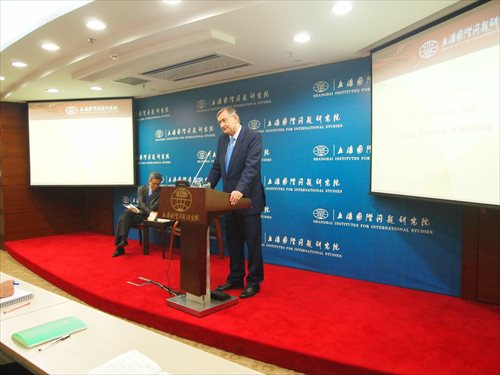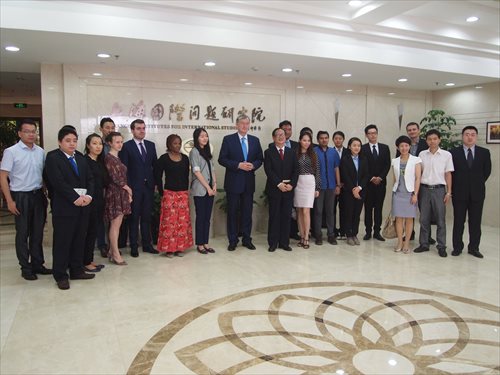Era of innovation
Former Slovenian President exchanges with Shanghai scholars and students of international studies
"If I look around the world today, the main innovation that is available is One Belt, One Road," said Danilo Türk, the former Slovenian President, while recently addressing an audience at the Shanghai Institutes for International Studies.
One Belt, One Road is a development strategy established by the Chinese government in 2013. It refers to the New Silk Road Economic Belt, which will link China with Europe through central and western Asia, and the 21st Century Maritime Silk Road, which will connect China with Southeast Asian countries, Africa and Europe.
The Slovenian diplomat compared the strategy as one of the most exciting innovations in international cooperation of this era. He said it is something that has provoked much thinking around the world and something that he believes people should discuss more thoroughly in the years to come.
"As I come from Slovenia, a small country and a member of the European Union, my perspective is that the strategy is an important opportunity for future cooperation between the European Union and China. That opportunity has to be used and has to be developed in a variety of mechanisms, some of which are already there and some are still in the making."
Seeking balance
Covering more than 20,000 square kilometers, Slovenia has a population just over 2 million. But the small country has been quite active on the international stage, joining the European Union in 2004, becoming a member state of the Euro Zone in 2007 and also that year joining the Schengen Area.
Türk told scholars and students of international studies in Shanghai that while many people would think of infrastructural projects for the One Belt, One Road strategy, which are critically important, he would also like to emphasize the significance of strategic communication with the Mediterranean more generally.
"One has to understand that the Mediterranean ports are becoming increasingly important in Europe. The northern sea ports are already congested. One has to think in a long term on how to find a good balance between North Sea and Mediterranean ports."
Port managers in Slovenia started casting their interest upon Asia around 2012. Suppliers from Japan and China have begun to export domestically-made electronic products, automobiles, and liquid cargo to central and eastern European countries via ports in Slovenia. In the other direction, raw wood materials from central and eastern European countries have been transported from these ports to Asian countries.
According to Türk, One Belt, One Road should also serve as an opportunity to redefine supply chains and offer more opportunities for small- and medium-sized companies. "The trains are not going to be only from Yiwu to Madrid, but also from Madrid to Yiwu. At present, we kind of have this unbalanced situation. So how can we balance it?"
Türk added that there are many small-sized enterprises in Europe and some of them work on high-technologies and are seeking for chances to cooperate with China.
A candidate
Although he used to be a lawyer, Türk, now in his early 60s, has been a politician and diplomat for the most part of his life. He was Slovenia's ambassador to the United Nations between 1992 and 2000, and the UN Assistant Secretary General for Political Affairs between 2000 and 2005. He served as the Slovenian president between 2007 and 2012.
Türk revealed that he will run for the 2017-2021 post of UN Secretary General next year; the current UN Secretary General, Ban Ki-moon of South Korea, who took office in January 2007, will finish his second five-year term at the end of 2016.
"I haven't yet thought about my campaign slogans," Türk laughed when asked. But he told the audience that the following issues would be his priorities if he could win the bid.
"I will make the work of UN Security Council as coherent as possible, improve peacekeeping operations and better use the UN system, which has a good network but hasn't been always actively used, to improve policy advice to member states."
Recalling his years of experiences working in the UN, Türk said it was a wonderful international organization. "I was representing a small state in the UN. At least once a week I said to myself 'it's such a wonderful organization that you have these big players - the big beasts - and then you have the small states.' But we sit in the same room and everybody has to listen to everybody else. In the United Nations, the majority of the states are small. They have a voice and have to be listened to. That's incredibly important."
When asked if the role that UN plays in international crises has declined in recent years, Türk admitted that the UN is apparently not in one of its best moments. "Those best moments are very few in history," he said.
"UN is not ideal and cannot be fully effective in all crises. But it has been successful in quite many situations. In some crises, the differences between the permanent members of the Security Council are too large and that makes it more difficult to find a solution," Türk said.

Danilo Türk, the former Slovenian President, at the lecture Photo: Ni Dandan/GT

Danilo Türk poses with scholars and students to his lecture. Photo: Ni Dandan/GT